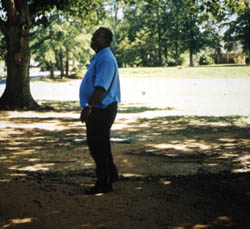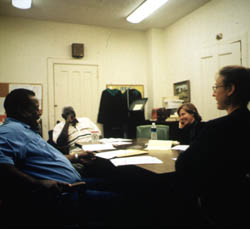 |
 |
|
 |

Whole Lives: The Durham HIV Life Review Project
Series Participant Mr. Johnnie Robinson
 |
 |
"I've been through a whole lot. I've been in and out of
jails. I've been in and out of hospitals. I've been through a lot
of hurting and a lot of pain. What good does all this do me when
I see other people out there suffering, and I got all this vital
information and not telling anyone about it?"
-- Johnnie Robinson
The Durham HIV Life Review component of the Southern Oral
History Program's "Listening for a Change" initiative encompassed
a year's worth of interviews and group life review sessions with Johnnie Robinson
and four other HIV-positive men who are clients of the Durham County, North
Carolina, Health Department's HIV/Early Intervention Clinic. The project was
instigated by clinic social worker Jennifer Sosensky, who wanted to provide
opportunities for people with HIV to create a lasting record of their lives
in a culture that often devalues or misunderstands their experiences. In addition
to Sosensky, interviewers for the project included SOHP research associate
Alicia Rouverol and folklorist Lisa Yarger. Four of the five men participating
in the project agreed to work with photographer Abigail Blosser to create a
visual autobiography of their lives.
Lisa Yarger and Alicia Rouverol
Conduct a Series Interview
 |
 |
Life review, a term coined by gerontologist Robert N. Butler in
1963, describes the process by which the elderly take stock of their
past, attempting to make sense of the experiences and forces that
shaped their lives. Recent studies in life review reveal that the
process of reminiscence and reflection occurs among people of all
ages, but particularly among individuals at critical junctures in
their lives. Yet life stories hold transformative power not only
for the teller but for the listener as well. By presenting narratives
and images of people with HIV that show them as individuals with
a diverse range of goals, fears, and life experiences, the Durham
HIV Life Review project seeks to shift public perceptions of those
living with HIV.
On December 2, 1999, the project offered the public just such an opportunity
through a multi-media presentation, "Whole Lives: Reflections on Living
with HIV." Held at the Durham Public Library, the event allowed project
participants to share their stories with an audience of health care workers,
social workers, at-risk youth, and the general public. Their stories challenged
stereotypes about people with HIV while also serving as cautionary tales. A
forum following the program enabled interviewees to speak directly to audience
members about their experiences within the health care system and the particular
effects of the life review project in which they had participated.
"Whole Lives" was co-sponsored by the Piedmont HIV Health Care Consortium
and the Durham County Health Department, and funded by the North Carolina Humanities
Council and the SOHP with additional support from the Center for Documentary
Studies at Duke University and the North Carolina Museum of History. Audiotapes
and selected photographs from the project are available in the Southern
Historical Collection at UNC-CH. Pending additional funding, project
staff hope to develop the "Whole Lives" multi-media program into a
video that can be distributed to community centers, public libraries, churches,
alternative education programs, health departments, and other sites across North
Carolina.
|
 |
 |


